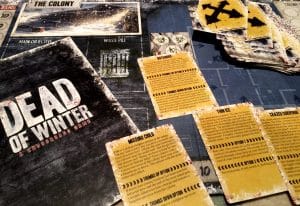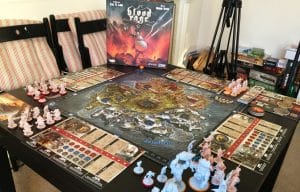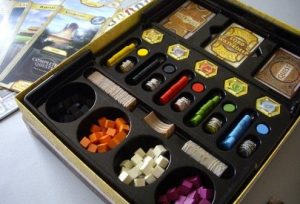If pressed to sum up my tabletop gaming strategy, I offer “Always Be Green.”
I’m a nerd, which means like most other nerds, I am a systems thinker. When I look at the world I see a very complex ecosystem, but one that ultimately can be understood. To a nerd, the world is a flowchart with a finite numbers of inputs, which cause a finite number of outputs.
 On a honest day I realize this flowchart is impossible, as the world is much too complex and my nerdy powers much too finite. But I’m holding tight to it, as it gives me a comfortable illusion of control and a functional understanding of a chaotic world. Placebos can be helpful.
On a honest day I realize this flowchart is impossible, as the world is much too complex and my nerdy powers much too finite. But I’m holding tight to it, as it gives me a comfortable illusion of control and a functional understanding of a chaotic world. Placebos can be helpful.
The handy side-effect is that I walk through life staring at, deducing, and building systems. And it comes naturally; it’s how I’m wired.
It’s also why I LOVE games. Modern board games are just systems with a theme, after all. So when I think about games, there is a well-defined process by which I consume a game, and it goes a little something like this:
- Discovery
- Optimization FTW
- Sharing
Winning at Board Games: Discovery!
The initial joy of a board game for the geek is in the discovery. This is a delicate balance of confusion followed by progressively more understanding. A game is initially attractive because it starts chaotic and unknowable, but even in the chaos, there’s always a hint of the rules… of structure. What are the specific rules that govern this game? And how might I learn them?
For a geek this sense of discovery and progress toward a knowable goal is a joy. I want to see the rules that define this particular universe… I want to see its edges. We’re looking for those edges because as soon as we discover the borders, we know this is a knowable thing, which is comforting because the game becomes a controllable thing. The rule book is how a geek conquers worlds!

This discovery is the hook where a geek is going to know in just a few minutes whether this particular game suits their particular appetite. But getting past the initial phases of discovery doesn’t mean you’ve successfully engaged the nerd. On to the next step…
Winning at Board Games: Optimization For the Win!
With the basic rule set discovered and defined, the process of optimization begins. Ok, I get how it’s played, but how do I win? This is the phase where, now equipped with the rules, the geek attempts to use them to their advantage.
Optimizing game play leads to a correct order, which, when followed, leads to fortune and glory (well, winning). This is the advanced mastery of the system around the rules that leads to exponential geek joy.
Test a strategy. Then another. Rinse. Repeat.
Through optimization and repetition, nerds will furiously work to uncover the rules of a game and then use those rules to determine how they might game a guaranteed win. But to actually unlock how to easily win is a buzz kill. The thrill, the adrenalin, comes from the experimentation, hunt, and eventual mastery of the unknown, which, confusingly, means if you want to keep a geek engaged in a game you can’t let them win without effort, even though that’s exactly what they think they want.
To get around this entertainment-killing buzz kill in subscription-based video games like World of Warcraft, game designers freely change rule sets as part of regular updates. The spin is, “We’re improving playability” which honestly translates into, “The geeks are close to figuring it out and we can’t have that because they’ll stop paying.”
This is why I love a little bit of randomness in a game (a d20 roll in D&D, for example). Randomness prevents us nerds from fully solving it like a puzzle, which leads to the buzz kill. Having felt like I’ve mastered Catan is why I’m bored with that game and currently love playing a game that unfolds like Pandemic Legacy.
But there is one last phase to consider: sharing.
Winning at Board Games: Sharing
 Once a geek has learned the game by discovering how to win, they become interested in how their win fits into the rest of the world. They want to compare and measure and answer the social question, “Is my pile of win bigger than yours?” They believe they’ve mastered the game, but reputation — achievement — is nothing unless someone else can see and acknowledge it.
Once a geek has learned the game by discovering how to win, they become interested in how their win fits into the rest of the world. They want to compare and measure and answer the social question, “Is my pile of win bigger than yours?” They believe they’ve mastered the game, but reputation — achievement — is nothing unless someone else can see and acknowledge it.
Before the Internet, winning was a private thing. You entered your three-letter name into the local Pac-Man machine and then anonymously stumbled off in search of Donkey Kong. In an interconnected world, games became social, and we looked for a means to compare our feats. We began to understand that achievement was not just becoming great at a game, but being recognized for being great.
Achievement can be as simple as an Instagram share or logging a play into Board Game Geek. You’ll commonly see folks share their game success on places like Twitter, because in a world where we spend a ton of time with people we’ll never meet, achievements are the currency of respect and identity. “Oh, you play that game! Me too…”
So when I pick up a new game like Pandemic Legacy, Blood Rage, or Dead of Winter I’m intuitively thinking about the phases of DISCOVERY (reading the rule book to see if the game is my jam), OPTIMIZATION (logging a few game plays to try out some different strategies), then SHARING (sometimes via writing about it on Nerds on Earth).
Did I actually unlock the secrets to guaranteed wins at every board game? Nope. In case you haven’t figured it out, it’s up to you to provide your own methods for discovery, optimization, and sharing. But us nerds always win, so I have faith in you.
As for me? The first thing I do when I crack open the box is to look at what color game pieces are included. Then I grab the green ones.
Because I’m always green.
[give_form id=”5476″]

